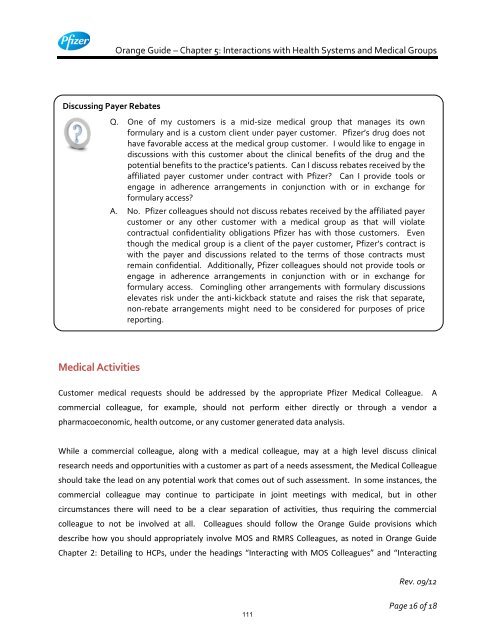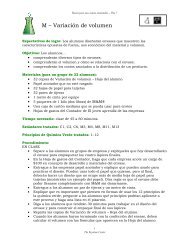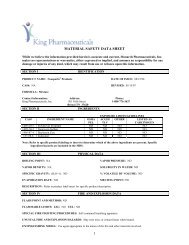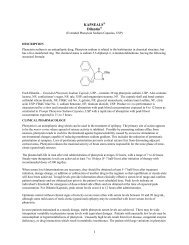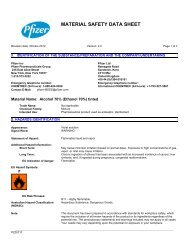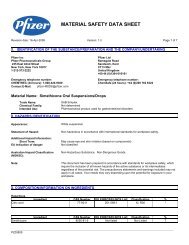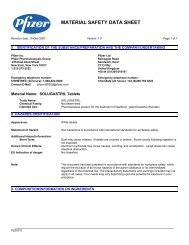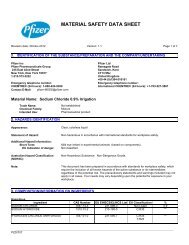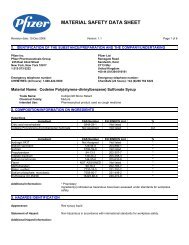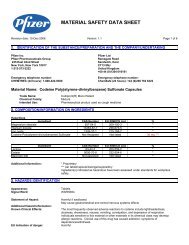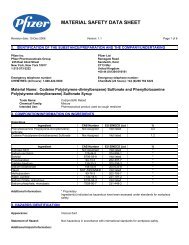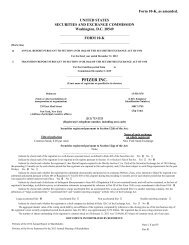- Page 1 and 2:
Dear Colleagues: Pfizer Inc 235 Eas
- Page 3 and 4:
To expand the bookmarks for a chapt
- Page 5 and 6:
Orange Guide - Chapter 1: Overview
- Page 7 and 8:
Orange Guide - Chapter 1: Overview
- Page 9 and 10:
Orange Guide - Chapter 1: Overview
- Page 11 and 12:
Orange Guide - Chapter 1: Overview
- Page 13 and 14:
Orange Guide - Chapter 1: Overview
- Page 15 and 16:
Foreign Corrupt Practices Act Orang
- Page 17 and 18:
Pfizer’s Corporate Integrity Agre
- Page 19 and 20:
Orange Guide - Chapter 1: Overview
- Page 21 and 22:
Orange Guide - Chapter 2: Detailing
- Page 23 and 24:
Key Points to Ensure Compliance Ora
- Page 25 and 26:
Orange Guide - Chapter 2: Detailing
- Page 27 and 28:
Communicating Formulary Status Mail
- Page 29 and 30:
Orange Guide - Chapter 2: Detailing
- Page 31 and 32:
Orange Guide - Chapter 2: Detailing
- Page 33 and 34:
Hospital Protocols Comparative Clai
- Page 35 and 36:
Orange Guide - Chapter 2: Detailing
- Page 37 and 38:
Orange Guide - Chapter 2: Detailing
- Page 39 and 40:
Interacting with RMRS Colleagues Or
- Page 41 and 42:
Orange Guide - Chapter 2: Detailing
- Page 43 and 44:
Orange Guide - Chapter 2: Detailing
- Page 45 and 46:
Orange Guide - Chapter 2: Detailing
- Page 47 and 48:
Detailing at Journal Club Meetings
- Page 49 and 50:
Orange Guide - Chapter 3: Support o
- Page 51 and 52:
Orange Guide - Chapter 3: Support o
- Page 53 and 54:
Orange Guide - Chapter 3: Support o
- Page 55 and 56:
Medical Education Grants Overview O
- Page 57 and 58:
International Grant Activity Orange
- Page 59 and 60:
Orange Guide - Chapter 3: Support o
- Page 61 and 62:
“Not-for-Profit” Defined Orange
- Page 63 and 64: Orange Guide - Chapter 3: Support o
- Page 65 and 66: Orange Guide - Chapter 3: Support o
- Page 67 and 68: Information on Pfizer’s External
- Page 69 and 70: Overview Orange Guide - Chapter 3:
- Page 71 and 72: Awards, Scholarships and Fellowship
- Page 73 and 74: Orange Guide - Chapter 3: Support o
- Page 75 and 76: Orange Guide - Chapter 4: Federal E
- Page 77 and 78: Orange Guide - Chapter 4: Federal E
- Page 79 and 80: Orange Guide - Chapter 4: Federal E
- Page 81 and 82: Promotional Activities Orange Guide
- Page 83 and 84: Orange Guide - Chapter 4: Federal E
- Page 85 and 86: Speaker Program Meals Part-Time VA
- Page 87 and 88: Orange Guide - Chapter 4: Federal E
- Page 89 and 90: Orange Guide - Chapter 4: Federal E
- Page 91 and 92: Orange Guide - Chapter 4: Federal E
- Page 93 and 94: Orange Guide - Chapter 4: Federal E
- Page 95 and 96: Orange Guide - Chapter 4: Federal E
- Page 97 and 98: Orange Guide - Chapter 4: Federal E
- Page 99 and 100: Orange Guide - Chapter 4: Federal E
- Page 101 and 102: Orange Guide - Chapter 5: Interacti
- Page 103 and 104: Orange Guide - Chapter 5: Interacti
- Page 105 and 106: Orange Guide - Chapter 5: Interacti
- Page 107 and 108: Orange Guide - Chapter 5: Interacti
- Page 109 and 110: Orange Guide - Chapter 5: Interacti
- Page 111 and 112: Orange Guide - Chapter 5: Interacti
- Page 113: Orange Guide - Chapter 5: Interacti
- Page 117 and 118: Orange Guide - Chapter 5: Interacti
- Page 119 and 120: Orange Guide - Chapter 6: Clinical
- Page 121 and 122: Orange Guide - Chapter 6: Clinical
- Page 123 and 124: Orange Guide - Chapter 6: Clinical
- Page 125 and 126: Orange Guide - Chapter 6: Clinical
- Page 127 and 128: Orange Guide - Chapter 7: P&T Commi
- Page 129 and 130: Orange Guide - Chapter 7: P&T Commi
- Page 131 and 132: Questions From a P&T Committee Memb
- Page 133 and 134: Orange Guide - Chapter 7: P&T Commi
- Page 135 and 136: Orange Guide - Chapter 7: P&T Commi
- Page 137 and 138: Orange Guide - Chapter 7: P&T Commi
- Page 139 and 140: Orange Guide - Chapter 8: Privacy:
- Page 141 and 142: Orange Guide - Chapter 8: Privacy:
- Page 143 and 144: Orange Guide - Chapter 8: Privacy:
- Page 145 and 146: Seek Only De-Identified Data Orange
- Page 147 and 148: Consent Forms and Mentorships Orang
- Page 149 and 150: REMEMBER Orange Guide - Chapter 8:
- Page 151 and 152: Proper Use of HCP Prescriber Data O
- Page 153 and 154: Orange Guide - Chapter 8: Privacy:
- Page 155 and 156: Orange Guide - Chapter 8: Privacy:
- Page 157 and 158: Orange Guide - Chapter 9: Speaker P
- Page 159 and 160: Orange Guide - Chapter 9: Speaker P
- Page 161 and 162: Speaker Selection Scheduling Issues
- Page 163 and 164: Use of Pfizer Approved Speaker Slid
- Page 165 and 166:
Orange Guide - Chapter 9: Speaker P
- Page 167 and 168:
Orange Guide - Chapter 9: Speaker P
- Page 169 and 170:
Providing In-Office Meals to Office
- Page 171 and 172:
U.S. HCP Payment Disclosure Policy
- Page 173 and 174:
Orange Guide - Chapter 9: Speaker P
- Page 175 and 176:
Closeouts Orange Guide - Chapter 9:
- Page 177 and 178:
Orange Guide - Chapter 9: Speaker P
- Page 179 and 180:
Physical Separation of Speaker Prog
- Page 181 and 182:
Chapter 10: STARTERS CONTENTS Start
- Page 183 and 184:
Key Points to Ensure Compliance Ora
- Page 185 and 186:
Orange Guide - Chapter 10: Starters
- Page 187 and 188:
Inclusion of Materials with Starter
- Page 189 and 190:
Orange Guide - Chapter 10: Starters
- Page 191 and 192:
Distribution of Starters to Colleag
- Page 193 and 194:
Orange Guide - Chapter 10: Starters
- Page 195 and 196:
Orange Guide - Chapter 10: Starters
- Page 197 and 198:
Orange Guide - Chapter 10: Starters
- Page 199 and 200:
Orange Guide - Chapter 11: Patient
- Page 201 and 202:
Orange Guide - Chapter 11: Patient
- Page 203 and 204:
Orange Guide - Chapter 11: Patient
- Page 205 and 206:
A special note about Medicare Part
- Page 207 and 208:
Refer any questions to your team at
- Page 209 and 210:
Chapter 12: CONTRACTING Introductio
- Page 211 and 212:
Orange Guide - Chapter 12: Contract
- Page 213 and 214:
Orange Guide - Chapter 12: Contract
- Page 215 and 216:
Key Points to Ensure Compliance Ora
- Page 217 and 218:
Chapter 13: HEALTH SCREENINGS Intro
- Page 219 and 220:
Orange Guide - Chapter 13: Health S
- Page 221 and 222:
If organized by Pfizer: Orange Guid
- Page 223 and 224:
Orange Guide - Chapter 13: Health S
- Page 225 and 226:
Orange Guide - Chapter 14: CGC Tool
- Page 227 and 228:
Orange Guide - Chapter 14: CGC Tool
- Page 229 and 230:
Discussing Pfizer Products While Me
- Page 231 and 232:
Orange Guide - Chapter 15: Non-Reba
- Page 233 and 234:
Orange Guide - Chapter 15: Non-Reba
- Page 235 and 236:
Orange Guide - Chapter 15: Non-Reba
- Page 237 and 238:
Orange Guide - Chapter 16: Consumer
- Page 239 and 240:
Orange Guide - Chapter 16: Consumer
- Page 241 and 242:
Orange Guide - Chapter 16: Consumer
- Page 243 and 244:
Providing Food to Consumers at a Di
- Page 245 and 246:
Orange Guide - Chapter 16: Consumer
- Page 247 and 248:
Content of Consumer Slide Decks Att
- Page 249 and 250:
Adverse Events Orange Guide - Chapt
- Page 251 and 252:
Orange Guide - Chapter 17: State La
- Page 253 and 254:
Orange Guide - Chapter 17: State La
- Page 255 and 256:
Orange Guide - Chapter 17: State La
- Page 257 and 258:
Orange Guide - Chapter 17: State La
- Page 259 and 260:
Orange Guide - Chapter 17: State La
- Page 261 and 262:
Orange Guide - Chapter 17: State La
- Page 263 and 264:
California Orange Guide - Chapter 1
- Page 265 and 266:
Orange Guide - Chapter 17: State La
- Page 267 and 268:
Orange Guide - Chapter 17: State La
- Page 269 and 270:
Orange Guide - Chapter 17: State La
- Page 271 and 272:
Orange Guide - Chapter 17: State La
- Page 273 and 274:
Orange Guide - Chapter 17: State La
- Page 275 and 276:
Orange Guide - Chapter 17: State La
- Page 277 and 278:
Educational Items Orange Guide - Ch
- Page 279 and 280:
Orange Guide - Chapter 17: State La
- Page 281 and 282:
Orange Guide - Chapter 17: State La
- Page 283 and 284:
Orange Guide - Chapter 17: State La
- Page 285 and 286:
Orange Guide - Chapter 17: State La
- Page 287 and 288:
Orange Guide - Chapter 17: State La
- Page 289 and 290:
Orange Guide - Chapter 18: Meals, E
- Page 291 and 292:
Orange Guide - Chapter 18: Meals, E
- Page 293 and 294:
Meals to HCPs Orange Guide - Chapte
- Page 295 and 296:
Orange Guide - Chapter 18: Meals, E
- Page 297 and 298:
Orange Guide - Chapter 18: Meals, E
- Page 299 and 300:
Orange Guide - Chapter 18: Meals, E
- Page 301 and 302:
Orange Guide - Chapter 18: Meals, E
- Page 303 and 304:
Orange Guide - Chapter 18: Meals, E
- Page 305 and 306:
Orange Guide - Chapter 18: Meals, E
- Page 307 and 308:
Orange Guide - Chapter 18: Meals, E
- Page 309 and 310:
Orange Guide - Chapter 18: Meals, E
- Page 311 and 312:
Orange Guide - Chapter 19: Sales Ac
- Page 313 and 314:
Pricing Considerations Orange Guide
- Page 315 and 316:
Orange Guide - Chapter 19: Sales Ac
- Page 317 and 318:
Orange Guide - Chapter 19: Sales Ac
- Page 319 and 320:
Orange Guide - Chapter 19: Sales Ac
- Page 321:
Orange Guide - Chapter 19: Sales Ac


